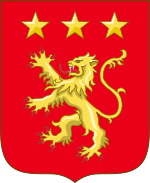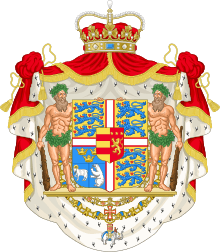House of Monpezat
The House of Monpezat (or Laborde de Monpezat; French pronunciation: [la.bɔʁd də mɔ̃.pə.za]) is a French upper bourgeois family associated with the Danish Royal Family by marriage after 1967, when Henri de Laborde de Monpezat wed Princess Margrethe of Denmark, heir presumptive of the ruling House of Glücksburg. In the event of ascension to the Danish throne of their son or male-line descendant, the main branch of the Danish Royal Family will belong patrilineally to the Laborde de Monpezat lineage. However, it is unclear which name the royal family will use in this event.[3]
| House of Monpezat Maison de Monpezat | |
|---|---|
 | |
| Country | |
| Founded | 1648[1] or 1655[2] |
| Current head | Frederik, Crown Prince of Denmark |
| Titles | |
| Estate(s) | Amalienborg Château de Cayx |
Family background
The Labordes were a well-to-do family of the middle-class originating from the region of Béarn in southwestern France which took the name Laborde de Monpezat[4], following the marriage of Jean Laborde to Catherine d'Arricau, dame de Monpezat on 16 August 1648. Letters patent of ennoblement were issued by Louis XIV of France in 1655.[5] But the elevation in status depended legally upon the family's recognition as noble by the province of Béarn, where their lands were located, in the form of registration of the king's decree by the Béarnaise Estates which, in 1703 and again in 1707, rejected the Laborde de Monpezat petition for validation.[5]
Nonetheless, the family survived the French Revolution under the name of Monpezat. By a decree of the Third cabinet of Napoleon III, the family's requests to legally change their surname to de Laborde-Monpezat (on 14 July 1860) and then to de Laborde de Monpezat (on 19 May 1861) were granted.[6] Under the present form of the name, the family supplied a mayor to the town of Pau in 1875 (Aristide de Laborde de Monpezat, b. 1830 – d. 1888, great grandfather of Prince Henrik).
Sometime late in the nineteenth century, the Laborde de Monpezats assumed the comital style,[5] using it as if it were a titre de courtoisie (that is, as an unofficial prefix rather than as a substantive title, e.g. "comte André de Laborde de Monpezat" rather than "André de Laborde, comte de Monpezat"). Traditionally the royal court and French society accepted such usage by genuinely noble families.
However, neither the nobility nor hereditary title of the Laborde de Monpezats is acknowledged as historically valid by the Encyclopédie de la fausse noblesse et de la noblesse d'apparence (English: Encyclopedia of False and Seeming Nobility) (Pierre-Marie Dioudonnat, Paris, 1976-1997), nor did Régis Valette include the family in his Catalogue de la noblesse française (English: Catalog of French Nobility) (2002). Charondas describes in his book A quel titre (Volume 37, 1970) the Laborde de Monpezat as "false nobles, low folk in the 17th century, not received in the states of Béarn due to 'alleged nobility,' and as having never had nobility in their family." On the other hand, since the title was assumed by Prince Henrik's ancestor prior to the twentieth century, it is possible he was unaware of the misuse until his family's history was scrutinized by genealogists after his engagement. Henrik's 1996 autobiography acknowledges the unsuccessful ennoblement.
Danish titles
| Danish royal family |
|---|
 |
|
HM Queen Anne-Marie of Greece |
| Extended royal family |
Danish law never officially required that royal spouses be of aristocratic origin. Nonetheless, no prince's marriage to a person who lacked male-line descent from royalty or titled nobility had been accepted as dynastic by the sovereign in the course of Denmark's history as a hereditary monarchy prior to Hereditary Princess Margrethe's marriage in June 1967.[7] From the date of that marriage "Count" Henri de Laborde de Monpezat was designated Prince Henrik of Denmark. In 2005, his wife having reigned as Queen Margrethe II since 1972, Henrik was officially declared Denmark's Prince Consort.
On 30 April 2008, the title "Count of Monpezat" (greve af Monpezat), was conferred by the Queen on both of her sons, and made hereditary for their descendants in the male-line, for both males and females.[8] The Queen's Private Secretary Henning Fode commented, "The Queen and the Prince Consort have considered this for quite some time, and it has led to the belief that it was the right thing to do." There was not an official publication of the grant, only a press release and a rescript were personally given.
In fact, Henrik had mentioned the possibility of associating his family name with that of his royal descendants as long ago as 1996, stating in his published memoir, "During our generation the future sovereign will perhaps receive approval to see 'Monpezat' added to the dynastic name of Oldenburg-Glücksborg".[9] While being interviewed by the French weekly Point de Vue in October 2005, Henrik raised the issue shortly after the birth of Crown Prince Frederick's firstborn child, Prince Christian, who is expected to inherit the Danish crown eventually: "It also makes him very proud and happy that Monpezat will be added to this small grandson's future name as Prince of Denmark. 'It is a great joy for me that his French roots will also be remembered.'"[10] Although no announcement was made at that time, Prince Christian does now include (part of) his French grandfather's surname among his hereditary titles. The grant does not extend this Danish comital title to Henrik himself, however. Nor has the Danish Crown issued a proclamation or statement indicating the name that the royal dynasty will bear after Queen Margrethe's reign (in accordance with tradition, she reigns as a member of her father's dynasty, the House of Glücksburg).[11]
Prince Joachim and his descendants now bear a coat-of-arms differenced from those of Denmark's royal shield of arms with Prince Joachim's arms featuring an inescutcheon impaled between the arms of Oldenburg and Monpezat, the arms crowned with a coronet of a prince of Denmark. Crown Prince Frederik's arms are, except for its use of the coronet of the crown prince of Denmark, identical to his mother's arms with the Oldenburg inescutcheon.
Family tree
- Jean Laborde, ca. 1620 - ????
- Paul Laborde de Monpezat, 1672 - ????
- Louis Laborde de Monpezat, 1711–1761
- Antoine Laborde de Monpezat, 1743–1787
- Jean de Laborde de Monpezat, 1786–1863 (The Laborde de Monpezat family requested to legally change their surname from Laborde de Monpezat to de Laborde-Monpezat in 1860, and to de Laborde de Monpezat in 1861)
- Aristide de Laborde de Monpezat, 1830–1888
- Henri de Laborde de Monpezat, 1868–1929
- André de Laborde de Monpezat, 1907–1998
- Henrik, Prince Consort of Denmark, 1934–2018
- Frederik, Crown Prince of Denmark, Count of Monpezat, born 1968
- Prince Christian of Denmark, Count of Monpezat, born 2005
Bibliography
- Pierre-Marie Dioudonnat, Encyclopédie de la fausse noblesse et de la noblesse d'apparence, 4 vol., Sedopols, Paris, (1976-1997).
- Régis Valette, Catalogue de la noblesse française (2002)
- Joseph Valynseele, Les Laborde de Monpezat et leurs alliances, Paris, 368 pages, 1975
Notes
- Valynseele 1975
- Chevé, Joëlle (1998). FeniXX (ed.). La Noblesse du Périgord: Au pays des 1.000 châteaux (in French).
- Danish Royalty Archived 2011-09-27 at the Wayback Machine. Retrieved 19 April 2011.
- "L'Intermédiaire des chercheurs et curieux 1967 p 81".
- Dioudonnat, Pierre-Marie, Encyclopédie de la fausse noblesse et de la noblesse d'apparence, Paris, Sedopols, 1976–79 (2 vols), French, p.208
- Joseph Valynseele, Les Laborde de Monpezat et leurs alliances, Paris, chez l'Auteur, 1975, French
- Huberty, Michel; Alain Giraud; F. and B. Magdelaine (1994). L'Allemagne Dynastique Tome VII Oldenbourg (in French). France. pp. passim. ISBN 2-901138-07-1.
- "Monpezat til Frederik og Joachim". Berlingske Tidende. 30 April 2008. Retrieved 2008-06-14.
- Henrik prince de Danemark, Destin Oblige, 1996, 102
- Levinsen, Niels (B.T.). "Henrik fulgte Mary time for time" (in Danish). Archived from the original on 2012-07-23. Retrieved 2008-06-17. Check date values in:
|date=(help) - "The Danish Monarchy". Archived from the original on 14 February 2010. Retrieved 20 September 2009.
External Articles
- Statistics from INSEE relating to the name Laborde de Monpezat supplied by Géopatronyme (French)
- Statistics from INSEE relating to the name Laborde de Montpezat (variant with a t) supplied by Géopatronyme (French)
